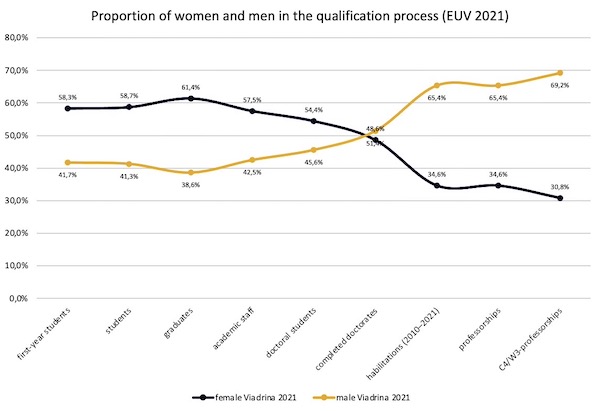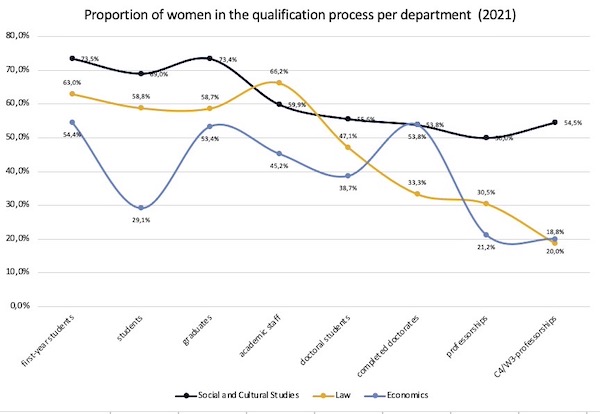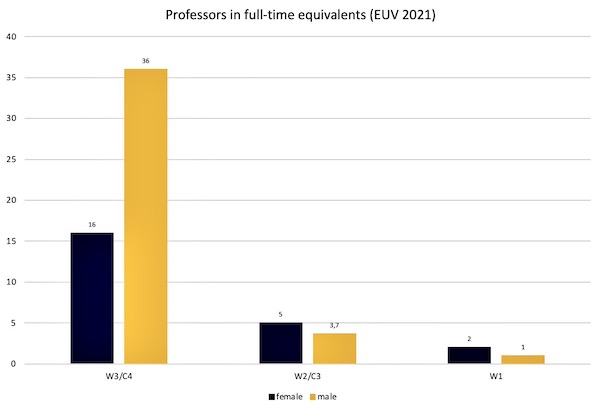Gender Equality Policy
Gender Equality and Family Focus at Viadrina
In December 2017, the Academic Senate and the Presidential Board of Viadrina adopted the Policy for Gender Equality and Family Focus (Gleichstellungs- und Familienkonzept, German only) for 2018–2021. This policy is the second follow-up, the original document was adopted in 2011. As early as in 2013 Viadrina was honoured by the Joint Science Conference of the German Federal Government and the Federal States (Gemeinsame Wissenschaftskonferenz – GWK) and the German Research Association (Deutsche Forschungsgemeinschaft DFG) for having an exemplary gender equality policy.
Viadrina continuously aims at actively strengthening gender equality and family focus in all areas and on all levels of the university as well as making studies, research and jobs compatible with care responsibilities.
The policy integrates for the first time both topics gender and family, following a successful audit and re-audit on family-compatible universities (2009–2015) and the development of an internal quality management for family affairs.
The diversity policy of Viadrina “Diversity as a Chance” (dt.: Vielfalt als Chance) includes intersections with further diversity dimensions such as age, ability, religion, sexual identity, ethnic and social origin and thus highlights the rising diversity of university members.
With its Policy for Gender Equality and Family Focus Viadrina participates in several benchmarking processes:
· Research-led Gender Equality Standards of the German Research Association (DFG)
· Quality Standards for Equality and Family Focus at Universities in Brandenburg
· Female-Professor-Program of the Federal Ministry of Education and Research
· Charta “Familie in der Hochschule”
Gender Equality and Family Focus at Viadrina 2018–2021 in a nutshell:
Due to the special profile of Viadrina with three faculties offering Cultural Studies, Law and Economics, there are no subjects like natural sciences or engineering, that traditionally attract lesser female students. Hence Viadrina has a high proportion of female students (more than national average) that does not vary significantly form Bachelor to Master. The leaky pipeline only starts during later qualification phases: in Law and Economics during PHD studies, in Cultural Studies in the postdoctoral phase.
Based on relevant data as well as evaluation of means of facilitation, Viadrina identified strengths and weaknesses in order to develop targets for the period of the policy:
Strengths
- high proportion of female students and female graduates in all subjects
- high proportion of female PHD and post-doctoral degree researchers in Cultural Studies
- proportion of female professors above national average
- balanced proportion in presidential board
- positive evaluation by German Research Association and Female-Professor-Program, as well as in gender equality ranking
- family-friendly university (two times certified via audit, now member in best-practice-club “Familie in der Hochschule”, family services since 2008
- Viadrina Mentoring Program for female students, doctoral and postdoctoral researchers
- higher predictability for academic careers by service agreements on contract terms and prolongations due to child care (for third-party-funded researchers as well)
- human resources development for academic staff
- anonymous application procedure for non-academic staff
- partly gender budgeting (rewarding the appointment of female professors)
- professorship with a partial denomination for Gender Studies
- optional MA-module “Transdisciplinary Gender Studies” in Cultural Studies
- full-time Chief Gender Equality Officer, Family Officer, Diversity Manager
- Vice-president is responsible for Equality Affairs
Weaknesses
- low proportion of female professors in comparison to previous qualification levels
- low proportion of female PHDs and Postdoc-degree researchers in Law and Economics
- partly low percentage of women in committees
- high proportion of academic staff with part-time and short-term contracts
- gender and diversity in research and teaching not integrated in all faculties
- no dual career strategy so far
- few offers for queer university members
- equality not yet included in university development strategy
- few measures for non-academic staff
Based on this analysis, Viadrina developed the following targets:
1) Integrating gender equality and family focus in university structures and processes
2) Creating equal opportunities for studying and removing gender stereotypes
3) Creating predictability and gender equality for academic careers
4) Increasing the proportion of female professors
5) Increasing the proportion in leading positions and committees
6) Creating gender equal and family compatible working conditions for non-academic staff
7) Integrating gender and diversity in teaching, research and transfer
Comprehensive measures and a time schedule as well as responsibilities were added to these targets and on faculty level measures were adapted according to separate Gender Equality Policys for Faculties.
In addition, the presidential board defined the following target numbers:
| career level | male | female |
| PHD completed | 50% | 50% |
| Post-doctoral degree completed | 50% | 50% |
| Junior professors (i.e. assistant, associate) | 50% | 50% |
| Professors | 62,3% | 37,7% |
| Professors (full professorship) | 65,3% | 34,7% |
| Leading positions | 66,7% | 33,3% |
... in Numbers
Here some numbers to show the current situation at Viadrina:





